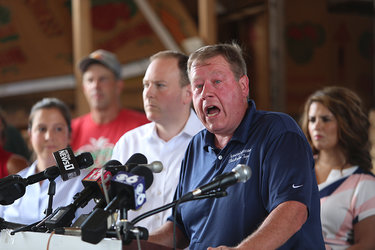GOP pols blast lowering threshold for farm workers’ overtime pay
NEW SCOTLAND — State and national Republican politicians gathered on Monday at the farm of an oft-local GOP candidate to rally against the impending decision to lower the threshold at which the state’s farm workers would begin to earn overtime pay.
Assemblyman and master of ceremonies Chris Tague was joined by, among others, Congresswoman Elise Stefanik and Congressman Lee Zeldin, who is running this fall against Governor Kathy Hochul. They held their press conference at Tim Stanton’s Feura Bush farm to speak out against what they view as the negative impact of reducing the farm-laborer overtime threshold from 60 hours to 40 hours per week.
With the passage of the Farm Laborers Fair Labor Practices Act in 2019, the state’s agricultural workers for the first time were by law eligible to join a union, take off one day a week, and earn overtime at one-and-a-half times their regular rate for any hours worked over 60 in a week.
The passage of the 2019 bill included the setting up of a Farm Laborers Wage Board, which, among other things, was to consider whether “overtime hours can be lowered below the 60 hours set in law,” according to the state Labor Commissioner’s charge to the board.
At a Jan. 28 meeting, the board adopted the following resolutions:
— The overtime threshold for farm laborers, currently set at 60 hours, should be reduced to 40 hours;
— The threshold reduction should be phased in over 10 years, with a four-hour reduction taking place every two years; and
— The phase-in schedule would begin on Jan. 1, 2024, with the threshold set at 56 hours; on Jan. 1, 2026, at 52 hours; on Jan. 1, 2028, at 48 hours; on Jan. 1, 2030, at 44 hours; and on Jan. 1, 2032, at 40 hours.
On Tuesday, Sept. 6, according to the Department of Labor, the three members of the Farm Laborers Wage Board will reconvene for a public meeting, at which time the board will vote to advance a report — testimony and information from hearings on the matter as well as motions made by the board — and its recommendations on the overtime threshold for farm laborers to Labor Commissioner Roberta Reardon.
Reardon would then have 45 days to review the report and recommendations and then announce a decision, according to the Department of Labor.
A refundable tax credit on overtime hours was included as part of this year’s budget, but Republicans at Monday’s press event weren’t having any of it.
Tague, who voted in favor of the farm-laborer overtime tax credit, said, “How much more can we subsidize? How much more can we subsidize? And for how long? … [The] American people can’t afford to really pay what food’s worth.”
The Republican argument, summed up in a statement by Dutchess County Executive Marc Molinaro, is that the “change to overtime pay could be the death of farming in Upstate New York. It is almost certain to exacerbate the current inflation crisis by driving up food costs. Farmers are afforded almost no choices in this situation. They will be forced to raise prices dramatically to cover the cost of overtime, or cut hours of their employees, reducing their income ….”
The left-leaning Economic Policy Institute in submitted testimony to the Farm Laborers Wage Board, wrote, “Despite numerous claims being made by agribusiness representatives that a more reasonable threshold of hours for overtime pay for farm workers will negatively impact the agricultural industry, there is virtually no credible evidence to support such claims, and certainly no ‘smoking gun’ evidence suggesting that overtime pay for farmworkers after 40 hours per week will hurt the industry or slash profits dramatically.
“In fact, the limited available evidence that does exist regarding the impact of overtime pay on the agricultural industry in the nation’s biggest and most important farm state, California — strongly suggests that is not the case, and perhaps even the opposite may be true. In other words, data on agricultural employment and wages in California suggest that overtime pay for farmworkers has not corresponded with any negative impacts or shocks to the California farm economy or labor market.”
There are 440 farms in Albany County, according to the latest United States Department of Agriculture Census, from 2017; 94 percent are family farms, and 26 percent hire farm labor.



